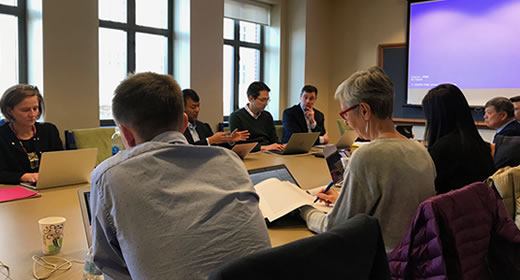
On March 16, the International Policy Center hosted distinguished guests for a research workshop entitled “China’s Impact in the International Development Arena.”
The 10 participants hailed from academic institutions in the United States and China and offered varying perspectives on China’s role in the international development landscape. The workshop series is a new initiative at the International Policy Center.
Daniel Russel, who served as Assistant Secretary of State for East Asian and Pacific Affairs from 2013 to 2017, delivered the keynote address. Mr. Russel spoke on U.S.-China relations, as well as China’s influence in a regional and global context. His address proposed optimistic steps for China and the U.S., such that the two nations “Find ways to work together to surmount and to reduce our mutual suspicion, to identify a shared interest in building global governance systems.”
Mr. Russel explained that, “The U.S. shouldn’t walk away from its global leadership responsibilities and China should seek to ensure that its international initiatives complement and not undercut existing international institutions.”
The workshop was facilitated by Mary Gallagher, Director of the Lieberthal-Rogel Center for Chinese Studies at University of Michigan, and John Ciorciari, Director of the International Policy Center at the Ford School. Ciorciari explained, “This expert workshop aimed to develop a better collective grasp of how and why Chinese aid matters in international development. Scholars shared insights about the mix of cooperation and competition between China and other major aid providers and the many domestic and international constraints Chinese authorities face as they seek to implement the signature Belt and Road Initiative.”
The day was structured into four sessions: China’s Approach to International Aid, The Belt and Road Initiative, Effects of Chinese Aid, and Chinese-led Development Institutions and Global Order. Under IPC’s workshop model, each session consisted of a conversation surrounding the participants’ respective research papers followed by often lively discussion focused on the nuances of differing expert opinion on development.
The workshop reflected the growing range of opinions on international development in the forms of transnational infrastructure projects and foreign aid. In moments of disagreement, participants offered challenging perspectives and were nuanced in their discussions following each presentation, contributing to robust and productive conversations. In essence, participants practiced what Mr. Russel promoted in his keynote address, to “find ways to work together to surmount and to reduce our mutual suspicion, to identify a shared interest in building global governance systems.”
-Ibrahim Ijaz BA '18